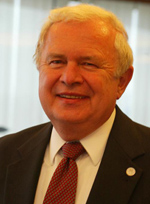|
"In the past few centuries the world was dominated by Western culture, and oriental culture is far from being understood by the West," said the former Chinese ambassador to France, Wu Jianmin, during his keynote speech to the congress at the opening ceremony. He said the wisdom of Chinese culture has yet to be mined in solving international conflicts today.

GLOBAL REACH: Outgoing President of the International Federation of
Translators Peter Krawutschke says during his three-year term, the organization was
truly international, and absorbed more members from China. (ZOU YI)
Krawutschke, professor of German literature at Western Michigan University in the United States who has translated works in English, French and German, said it is a pity that he knew nothing about Chinese literature. Yet, in contrast, German writers Johann Wolfgang von Goethe and Johann Christoph Friedrich von Schiller are household names in China, and most literature lovers in the country could name at least one or two books by each author.
Krawutschke said his mother first knew about China from a 1930s' novel, The Good Earth, written by American Pearl S. Buck and sold in Germany. He said she was exposed to China through another Westerner's eyes because American and European culture and literature are closer than European and Chinese culture and literature. American books are also better marketed in Europe. "Most of the world does not know Chinese, therefore there is a fear of Chinese. To bridge the gap, we need translators and interpreters," said Krawutschke.
He suggested that a Chinese translator could sit on FIT's literature translation committee to promote Chinese literature. He believed that FIT would support the exposure of Chinese literature in the Western world and even market the best Chinese authors in Europe, especially France.
At the same interview, Huang said TAC wants to recommend that all FIT special committees have Chinese translators to help spread Chinese culture as well as learn from their foreign colleagues.
Krawutschke, who heads the Department of Foreign Languages at his university, said that he had supported the introduction of teaching Chinese and Japanese at Western Michigan University, and that Chinese has become one of the most popular foreign languages to study among his students.
The year of 2008 has been proclaimed by the UN Assembly the year of language. The UN also sent an eight-member delegation, led by Assistant Secretary-General Yohannes Mengesha. It was the largest UN delegation dispatched to a FIT congress. Mengesha, also a keynote speaker at the congress, said the UN's mission to avoid conflicts, encourage dialogue between civilizations, and respect diversity are one and the same.
Cashing in on languages
"We can see clearly from this congress that the prosperity of translation and interpretation in one language largely hinges on the economic development of the country or countries where it is spoken," said Huang.
Although multilingualism and cultural equality were the fundamental values of the congress, an obvious phenomenon at the congress was that there is more gold to mine in some languages than others.
In business circles, the demand for translation services from major languages into Chinese has been booming as multinationals have been competing to enter the Chinese market over the last few years. The localization sector, made up of companies helping to adapt products and services to a local market, not only in language but also in content and application solution, has been an area of growth in language services. According to a survey conducted by TAC, the total revenue of China's language service sector reached 30 billion yuan ($4.3 billion) in 2007, of which over 80 percent was earned by localization companies, and the market still has great potential for growth.
| 